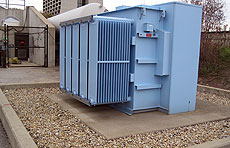Gulf oil leak reinforces need for quality risk assessment
 |
| This transformer at MuCool contains 620 gallons of oi, and sits in a structure that would contain the entire volume in the event of a major leak. It is one of more than 350 oil-filled transformers on the Fermilab site, which together store over 300,000 gallons of oil. |
The Deepwater Horizon oil spill is the worst environmental disaster in U.S. history. How could this happen? Why weren't the risks better understood? Why can't they stop the leak? What can we learn from this? Questions abound but answers are elusive.
Everyone can learn from this experience and take a closer look at how they assess and prepare for risks.
At Fermilab, we go about our daily business of exploring the secrets of the universe and, while our answers are not 25,000 feet below sea level, there are risks to consider.
We assume the drillers', the owners of the Deepwater Horizon and the regulators who sought to minimize the risks didn't set out to dump more than 2 million barrels of oil into the Gulf. But this raises questions about whether they miscalculated a key risk component--namely, the probability of an accident scenario actually occurring--and/or underestimated the potential magnitude of the impact, which we now know was astronomically high and has had devastating consequences.
Fermilab has a policy of conducting hazard assessments on small and large projects alike to consider worst-case scenarios and how to prevent or mitigate them.
It's impossible to eliminate all risk or to completely guard against bad things happening without shutting down all exploration and discovery. But whether we formally document a project risk assessment plan or prepare to carry out a simple task, we must seriously ask ourselves and methodically answer basic questions, such as "What could possibly go wrong?" and "What if it did?"
Environmental laws were written to assist in answering these questions. The concept is the same as Fermilab's successful 'Take Five' program - taking the time to seriously and honestly consider the potential consequences of actions and taking measures to avoid or minimize them. Recognizing when the risk is too great to proceed is difficult, but these actions are necessary to avoid problems, regardless of their scale.
-- Teri Dykhuis, Environmental Engineer/NEPA Compliance Coordinator, ESHS
-- Rod Walton, Fermilab ecologist, FESS
Safety Tip of the Week Archive
|